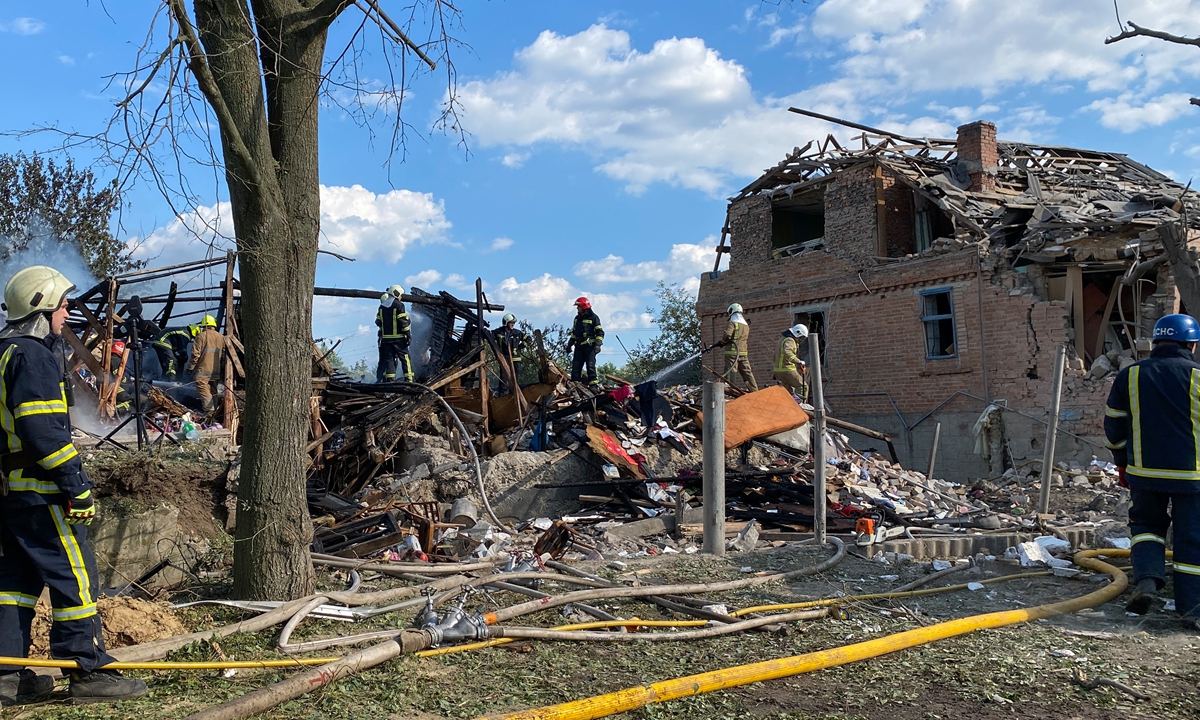
Rescuers and firefighters work at a destroyed residential house after Russian air attack in Poltava Oblast, Ukraine on June 7, 2024. Photo: VCG
A Summit on Peace in Ukraine was held in Switzerland from June 15 to 16. Heads of state or their representatives from more than 90 countries, half of which are from the West, attended the event. Most of the Western leaders who had just finished the G7 summit in Italy went to Switzerland to support the meeting. The host, Switzerland, said the meeting mainly aims to "inspire a future peace process" that could eventually involve Russia. But Western media treated the "peace summit" as a meeting to take sides. Bloomberg even listed in detail which influential Global South countries attended this event, the level of their personnel and attitude. China, India, South Africa, Brazil, Saudi Arabia and other countries are on that list.
According to some Western media reports, the meeting sent invitations to more than 160 countries and international organizations, but the specific list of attendees was changed again and again and ultimately failed to exceed 100. Brazil, India and South Africa sent lower-level representatives to the meeting, and dozens of other countries were absent. The Western media expressed disappointment at the outcome, mainly because of the "failure to isolate Russia." While recognizing that the meeting was "unlikely to produce major results, they blamed China for the lack of participation and even called the "six-point consensus" between China and Brazil on a political settlement of the Ukraine crisis, intended to stand against the West, a "skillful boycott" of the Swiss conference. This is baffling.
Of course, there are rational voices in the West. For example, when discussing why Russia was not invited, Germany's Junge Welt pointed out that the conference had been misleadingly touted as a "peace summit" but that the West was trying to politically push Russia into a corner, and that the vast majority of non-Western countries had not followed suit by agreeing to participate in the "political show." It wasn't until the conference drastically lowered its goals that things changed a bit. The conference changed the original plan to discuss 10 goals to three - food security, nuclear safety and humanitarian assistance, which are common concerns of the international community, including developing countries, and are also covered by the China-Brazil "six-point consensus."
Blaming developing countries, including China, for rejecting peace is not tenable in any way. Since the outbreak of the Ukraine crisis, China has regarded a cease-fire, the resumption of dialogue and the launching of peace talks as the only viable option for resolving the crisis, which is also the general sentiment of most members of the international community. China supports a peace summit that is committed to resolving the crisis, but has repeatedly emphasized that such a conference should have three important elements - the recognition of both Russia and Ukraine, equal participation of all parties and fair discussions on all peace proposals. This is not just the view of the Chinese side. Saudi Arabia's Foreign Minister Prince Faisal bin Farhan said on Saturday that any credible peace talks on the Ukraine conflict would need Russia's participation.
Each country has its own considerations on whether to participate in this meeting in Switzerland. China respects the right of other countries to independent and autonomous diplomacy, and at the same time maintains its autonomy in promoting peace talks. In this process, we can clearly feel the confrontation between two forces. One force is trying to promote the narrative of "good versus evil" and then create divisions and camp confrontations in the international community in the name of "whether to support Russia;" while the other force hopes for a cease-fire and end to the war, and is eager to promote the joint efforts of the international community to achieve true peace. China did not create the Ukraine crisis, nor is it a party to the crisis, but has been doing its utmost to promote peace talks. From the document entitled "China's Position on the Political Settlement of the Ukraine Crisis" to the "six-point consensus," China's position has been consistent and has been widely recognized by the international community, including many Western countries. Who are creating divisions and who are bridging them? Who belong to the former and who belong to the latter does not need to be stamped by the "Ukraine peace summit" to distinguish.
The Ukraine crisis has entered its third year, and the conflict is in danger of expanding further. The top priority is to achieve a cease-fire and an end to the war as soon as possible, and the most important thing is to take action. Some Western media said that the goal of this meeting is to reach an international consensus on the Ukraine crisis and "take the first step towards peace." However, public opinions generally believe the hope for peace is still very slim, and the actual results achieved by the meeting will be quite limited. Why does this happen and what is the crux of the problem? In fact, it is not difficult to draw conclusions from the various details of this summit. It also reflects once again that without a common, comprehensive, cooperative and sustainable security concept, it is completely foreseeable that relevant peace summit will achieve "little results."




